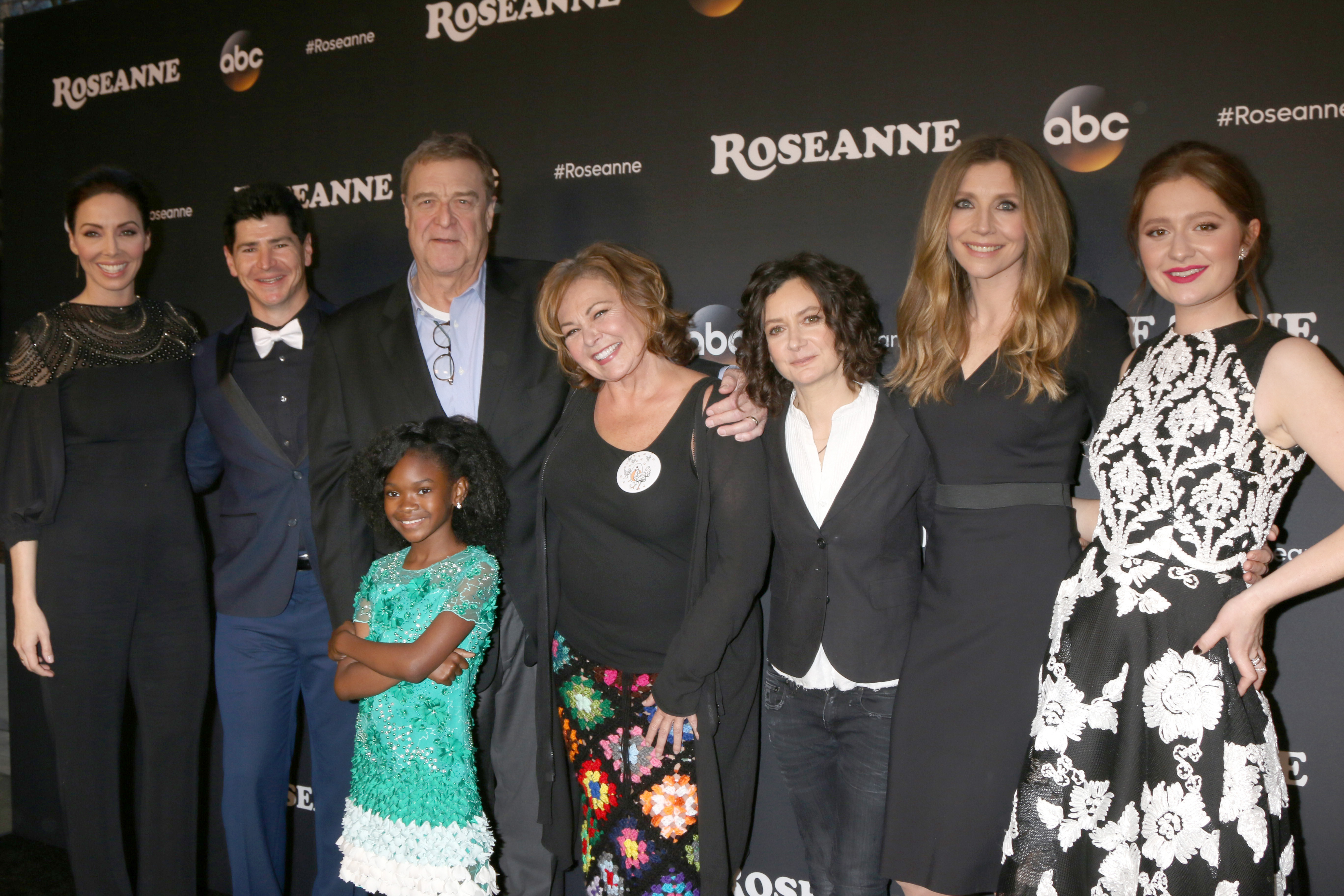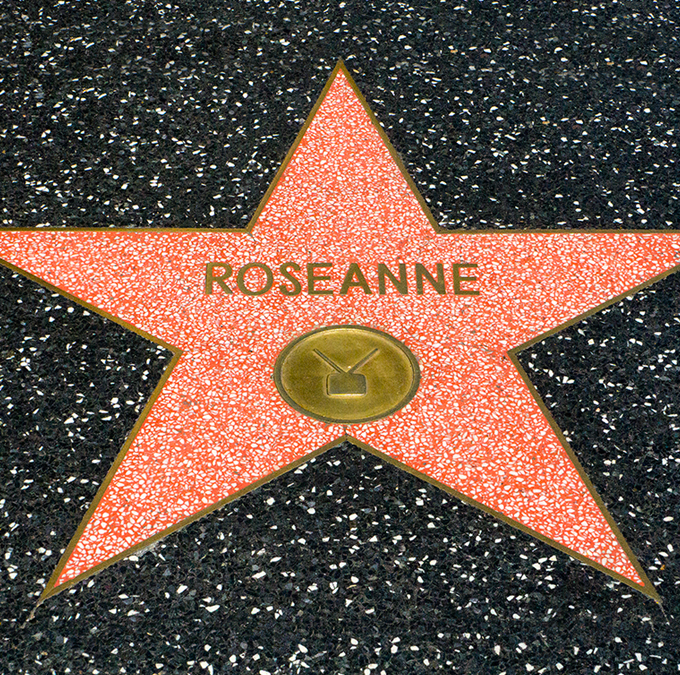
Cast of Roseanne
Photograph via Shutterstock
I watched the “Roseanne” reboot skeptical but curious, my cultural antennae probing for select varieties of spoiled fruit: xenophobia, transphobia, islamophobia, liberalphobia. I had already read pixel bins full of criticism before settling in, including Barr’s interview with Patrick Healy at The New York Times, so I was prepped. My reconnaissance was on fleek—for a forty-something, white, heteronormative, suburban dwelling, liberal elite PhD, turned temporary sitcom pundit.
There was Richard Morgan’s even-handed put-up or shut-up CNN review, in which he points out that people’s progressive political opinions don’t seem to extend to their sitcom selections, since almost no one (in comparison to “Roseanne’s” 25+ million viewers) watches sitcoms like “Fresh Off the Boat” or “Blackish.” Morgan misses the possibility that the people who are slinging mud over the “Roseanne” reboot might not be sitcom watchers, and he’s mum as an Ancient Egyptian burial attendant on all of Barr’s bizarre conspiracy twitterings, but he’s mostly right on the ratio of social outrage to private practice.
Roxane Gay’s review in The New York Times was particularly arresting, because it somehow managed to be critically benign and politically fraught—often within the same paragraph. “Roseanne” the show is good because the show is “excellent,” and the “faces are pleasantly familiar,” and Gay “laughed.” Roseanne the comedian is bad because she “voted for a president who doesn’t think the black life of [the Connors’ fictional] granddaughter matters.” Her review is full of the kind of observations you understand but regret having to listen to, like when you ask an acquaintance how their day is going, and they decide to tell you about it. Gay’s politics seem entirely rational, but the complete absence of a fourth wall in her “review” is disconcertingly Victorian. This is just not how decent people behave, she seems to be saying. Whether she means the actors or the characters they play is not entirely clear.
“American sitcoms are like gelded satyr plays.”
Just for the record, like Gay’s Trumpian projection, I also don’t care about the Connors’ fictional African-American granddaughter, or any of the Connors for that matter, and neither should you. American sitcoms are like gelded satyr plays. They’re not designed to stimulate dramatic affections or disaffections. And they’re definitely not tailor made for sophisticated political theater. There’re no character arcs. No transformations. No tragic or comedic reveals—except for fleeting uncertainties that quickly regress to the situational mean (a very popular bit, for example, in the late 70’s sitcom “Three’s Company,” in which someone was always overhearing that so-and-so was sleeping with such-and-such, even though no one was ever sleeping with anybody). The Council on Foreign Relations will not be producing a sitcom any time soon.
So while I agree with Gay that the African-American granddaughter’s absence is conspicuous, I don’t find it more conspicuous than the fact that Dan isn’t dead—as he was in the previous series finale—or that there’s absolutely no mention of Jackie’s baby. Maybe these storylines will return, maybe they won’t, but who cares. These storylines are about as far from the point as are Connor-Barr’s politics, and they don’t reveal a larger disregard for the lives of black Americans any more than they reveal a disregard for the consequences of obesity (Dan) or motherhood (Jackie).

Satyr seated on eave.
“…if you’re interpreting the titular character’s political leanings or parsing the creator’s one-court-order-away-from-a psychiatric-evaluation social media posts, you’re reading the wrong things.”

Wagon circle on an open plain.
I’m not suggesting that a critic or curious consumer can’t glean valuable information from watching sitcoms—”Roseanne” or otherwise. What I’m saying is that if you’re interpreting the titular character’s political leanings or parsing the creator’s one-court-order-away-from-a psychiatric-evaluation social media posts, you’re reading the wrong things. We don’t need Roseanne to be an Obama supporter to know that the United States has never properly dealt with the history of slavery.
Sitcoms are primarily about tribal cohesion. The social group depicted (family, peer, or workplace) is tasked with maintaining its identity and proper group relations amidst both interpersonal and social trials. Non-tribal members are props, usually antagonistic to the tribe’s integrity (think Richard on “Friends,” or Colonel Sam Flagg on “M.A.S.H.”), but so too are politics, work in the case of the family sitcom, and family in the case of the workplace sitcom. When sitcoms are particularly popular, such as “Will & Grace” in the 00’s, “Friends” in the 90’s, “The Cosby Show” in the 80’s, or “The Jeffersons” in the 70’s, the tribe is often a palliative for demographic anxiety. Namely, in reverse order: it’s okay America, economic success doesn’t mean that blacks will lose their difference; it’s okay America, black cultural progress isn’t a threat; it’s okay America, Generation X doesn’t need a nuclear suburban family to survive; it’s okay America, homosexuals are just as shallow as you are.
“Sitcoms are primarily about tribal cohesion.”
The “Roseanne” reboot appears to be one of those palliative sitcoms. It’s too early to tell, of course, but the fact that its viewership blew away every other show of the last four years (going back to the 2014 premiere of “The Big Bang Theory”) says something. More importantly, that it performed that well, according to Deadline | Hollywood, without placing in the Top 20 in the largest U.S. market, New York, or the Top 30 in Los Angeles, the second largest market, is a strong indicator the show has tapped into something. But what has it tapped into?
Latent racism? Trumpism? Xenophobia? Nostalgia for the good ‘ol days of unapologetic bigotry and small-minded provincialism? If you’re reading everything through the lens of the 2016 election then, yeah, it’s probably one of those—or all of those. After all, it’s not hysterical to scream “fire!” if you think the world’s on fire. Of course, the world’s always been on fire—just ask Billy Joel—but sometimes the blaze burns out of control. I don’t know how close we are to losing containment, but I do know that vilifying run-of-the-mill humans isn’t helpful when there are real villains marauding the countryside. Ultimately I don’t blame the moralizing critics, so much as I lament the social frenzy that has haggard their imaginations.
“Roseanne,” the show, isn’t about politics—at least not the kind of politics the pundits are carping about. It’s formulated like every other sitcom. It’s about the Connor tribe. And the point of their palliative lampoon is this: it’s okay America, struggling white families are more concerned with their own disappointments than sabotaging your social progress. In the Connors’ social universe Trump is a prop as much as Jackie’s pink pussy hat is a prop, and they are used to show how this family maintains its integrity in the face of rapidly shifting economic and social conditions. Trump is as irrelevant as Roseanne Barr’s Ted Nugent style ramblings. They are the effluvium atop a tremendous tidal shift in American culture. They are the punchlines in a much larger comedy.


0 Comments